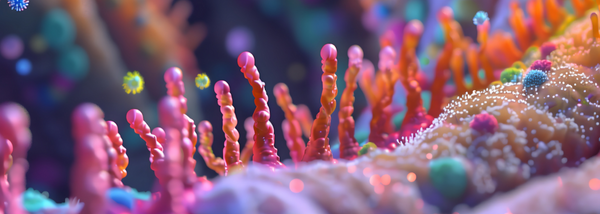What is Butyrate: The Vital Role Butyrate Plays in Gut Health
Key Takeaways:
- We cannot make enough butyrate because we eat too few resistant starches
- Butyrate is a necessary component to a balanced microbiome, also working as an inflammation guard*. One of several, short-chain fatty acids created from fermented resistant starches, low butyrate levels have been associated with serious health concerns.
- Butyrate not only nourishes the gut but also promotes cell differentiation, helps to regulate blood sugar, and promotes healthy DNA*.
Our gut is where the immune system gets its oomph, where the final products of digestion sit, and where water is absorbed into the body. About 400 different kinds of bacteria live there, most of them good, some not so much. Maintaining balance of these bacteria is critical to staving off one or another pathology, including IBS/IBD, diverticular issues, and even polyposis.
The bottom line is that no one should suffer colon disease, and fewer have to if healthy and appropriate bacteria levels are maintained.
The cells that line the colon walls are called colonocytes. These endothelial beauties are flat and constitute a layer that is only a single cell thick. They live shorter than a week and then are replaced by new ones. Because of this high turnover rate, there’s no need to do harsh cleanses, our bodies do the work for us!.
All cells need a source of energy to do their work. Evidence is strong that the epithelial lining of the gut relies more on luminal energy supply than on vascular, meaning that energy comes from outside, not from the bloodstream, as most cells require. So, then, what is this energy supply? Short-chain fatty acids (SCFA’s) derived from the bacterial fermentation of resistant starch are the luminal substrates for colonocytes.
Butyrate is a short-chain fatty acid produced by bacteria in the colon that’s essential for a healthy microbiome. In fact, appropriate levels of butyrate are key, not only to digestion, but to cellular and DNA health as well as a reduction in disease.
The Myriad Benefits of Butyrate
Prevention of Colonic Diseases
Of the short-chain fatty acids, and those having fewer than six carbon atoms, butyrate is the one that nourishes the gut and promotes cell differentiation, a process that helps to prevent serious colonic diseases.* Because of its protective nature, butyrate is a most desirable molecule and is to be cultivated as a friend or, at least, introduced as a partner.
Reduced Inflammatory Diseases
The fiery process of inflammation is linked to most chronic disorders, from heart attack to stroke to type 2 diabetes. Inflammation fuels a cytokine known as interleukin-6 (IL-6), which remains elevated in chronic sickness. Butyrate is a rescue molecule in inflammatory diseases, wherein it impairs the oxidative processes that initiate their genesis*.
Multi-purpose Repair from Gut to Brain
Butyrate inhibits enzymes that deleteriously unwind DNA, just like the kinked-up Slinky we ruined as kids. Butyrate sequesters harmful ammonia that forms from faulty protein metabolism and/or from inborn metabolic errors. In clearing mental fog, it increases brain-derived neurotrophic factor*. Depending on its concentration, butyrate decreases intestinal permeability, closing tight junctions and preventing leaky gut*.
Butyrate Side Effects
The good news is there appear to be very few side effects associated with supplementing Butyrate. Our on staff expert RD, Dr. Tom, says “All reports in the medical papers admit there are no known ill effects from butyrate taken at "normal" doses, which I have extrapolated to be less than 8.0 grams a day for several months. One study does state that more than 20.0 grams a day will waken latent herpes simplex (fever blisters). But that high a dose is not recommended.”
Dr. Tom also notes that, “colonocytes absorb Butyrate supplements immediately and rapidly, with more than 95% precision and completeness. The remaining 5% goes to the toilet.” The FDA cites Butyrate as Generally Recognized As Safe (GRAS).
What Causes Low Butyrate?
At this point, you may be wondering if you’re deficient in Butyrate, or how you would know if you may be? Again, we took this question to our resident expert, Dr. Tom, who let us know that the only way to truly know is by taking a stool test. But, he also stated that if you’re not getting adequate fiber from starchy foods in your diet, chances are good you could use some extra butyrate. As we know, the SAD (Standard American Diet) is full of processed foods that are devoid of fiber and 25-28 grams we need per day are generally lacking in many diets.
Symptoms of Low Butyrate Levels
Another way to determine if you may be deficient in butyrate is to consider common symptoms of those who are. These symptoms take time to develop and can include:
- Leaky gut
- Foggy thinking from faulty protein metabolism and consequent ammonia accumulation
- Bloat
- Chronic diarrhea
- Eventual IBS/IBD
- Crohn's disease
- Behavioral irregularities
- Aberrant fatty acid metabolism
- Upset microbiome balance
- Increases in inflammation markers
- Reduced insulin sensitivity
- Missteps in DNA replication
How to Increase Butyrate in the Colon?
Foods Containing Butyrate
It is possible to get butyrate from the foods you consume, but in looking at the average diet, there is generally not enough slowly-digesting fibers to produce the necessary levels with food alone. That’s because a lot of the foods highest in resistant starch are not particularly appetizing, think cold mashed potatoes and white rice.
Foods that do help boost butyrate include:
- Dairy (but the high serving sizes needed may not be recommended for all)
- Cold rolled oats (try soaking notes in non-dairy milk overnight!)
- Legumes (when cooled after cooking)
- Cooled potatoes and cooled white rice
- Underripe bananas and plantain flour
- Whole grains
- Fibrous vegetables like asparagus and broccoli stems, some fruit peels like apples
While many foods contain small amounts of butyrate producing resistant starch, it’s still quite hard to reach the adequate amount. For this reason, ample supplementation with a butyrate supplement is vital to overall well-being.
Butyrate Supplements
Supplementing butyrate is a great way to keep your gut happy and healthy, but as always, quality matters! BodyBio’s Butyrate are simply butyrate, a thirteen-atom complex joined to an alkali. Butyric acid, butyrate, and tributyrin are ingredients you may see in this category of supplements. Yes, they have the same purpose, but very different characteristics.
At BodyBio we use butyric acid aka butanoic acid, a short chain fatty acid with four carbon atoms at its heart (found in butter, hence its name). As an acid, it has a low pH so we compound it with an alkali, a combination that forms a salt + water. At this stage, we no longer have butyric acid, but butyrate, a buffered form of butyric acid. This process creates a superior product that you can trust.
Interested in trying butyrate? Learn more here






